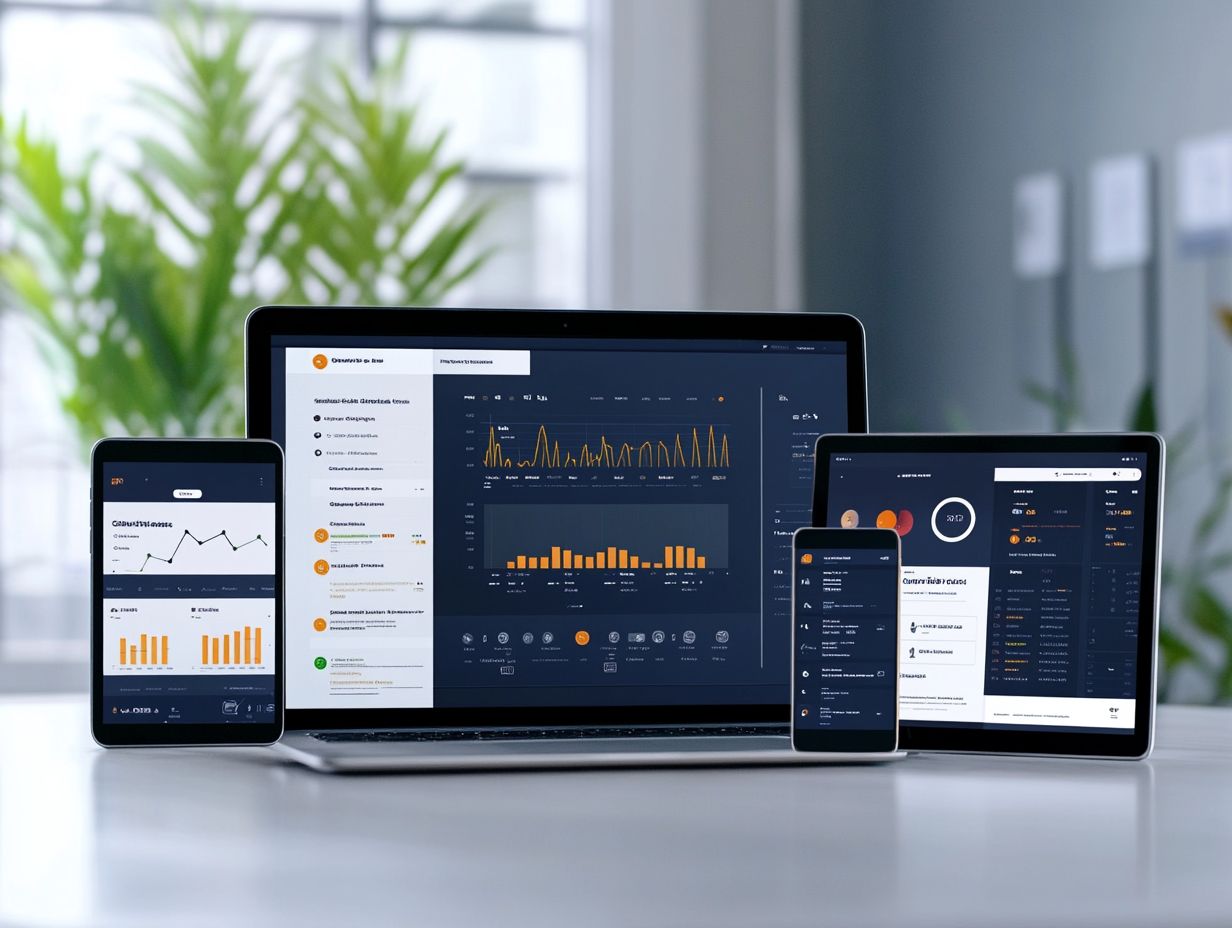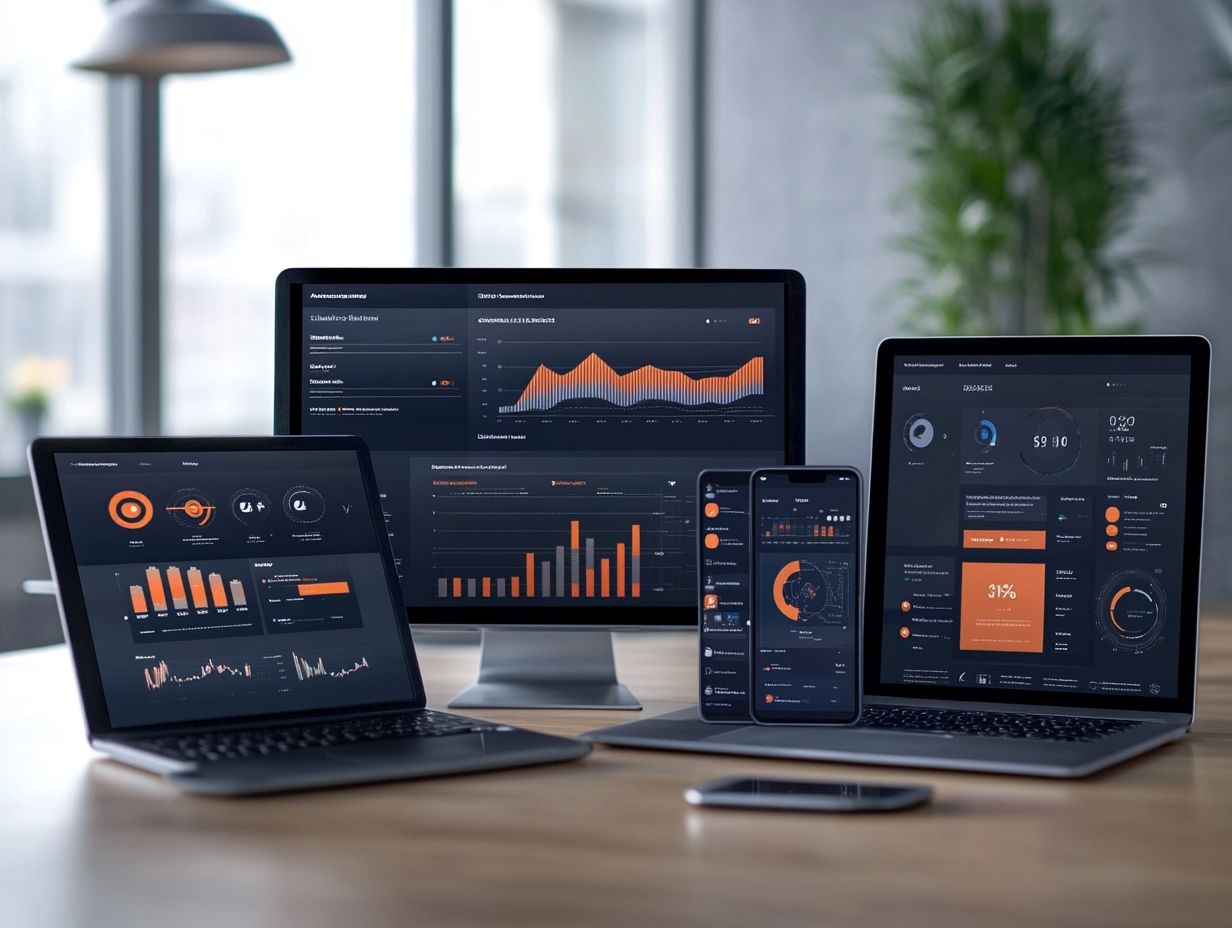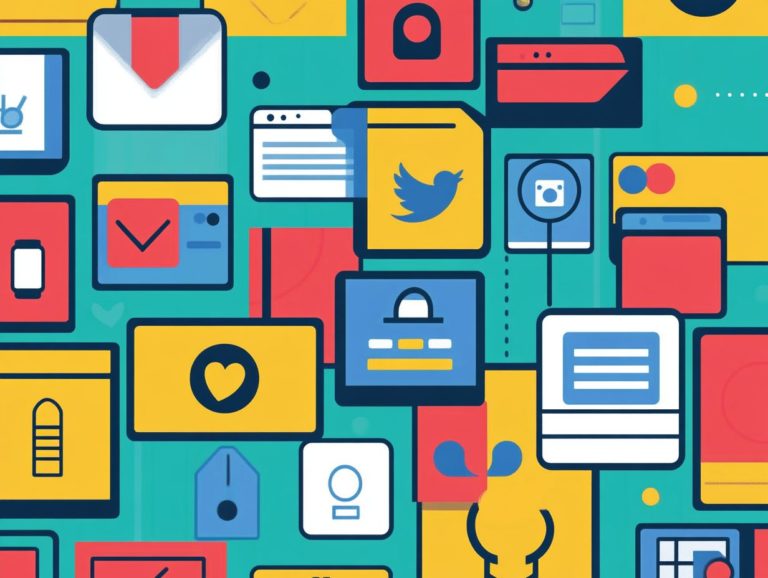Top 5 CRMs for Customer Support Teams
In today s fast-paced business landscape, exceptional customer support is vital for maintaining a competitive edge. Choosing the right Customer Relationship Management (CRM) system helps businesses manage their interactions with customers and can significantly enhance your team’s efficiency while elevating customer satisfaction.
This article delves into the top five CRMs designed specifically for customer support teams: Salesforce Service Cloud, Zendesk, Freshdesk, HubSpot Service Hub, and Zoho Desk. You will uncover essential features to seek out, understand the impact of CRMs on support processes, and receive valuable tips for selecting the perfect fit for your organization.
Get ready to transform your customer support journey!
Contents
- Key Takeaways:
- 1. Salesforce Service Cloud
- 2. Zendesk
- 3. Freshdesk
- 4. HubSpot Service Hub
- 5. Zoho Desk
- What Is a CRM and Why Is It Important for Customer Support Teams?
- What Are the Key Features to Look for in a CRM for Customer Support?
- How Can a Customer Relationship Management (CRM) System Improve Customer Support Processes?
- What Are the Different Types of CRMs Available for Customer Support Teams?
- What Are the Pros and Cons of Using a CRM for Customer Support?
- How Can a Business Choose the Right CRM for Their Customer Support Needs?
- What Are the Common Challenges Faced by Customer Support Teams and How Can a CRM Help?
- What Are the Best Practices for Implementing and Utilizing a CRM for Customer Support?
- How Can a CRM Benefit Other Departments in a Business, Apart from Customer Support?
- What Are the Future Developments in CRM Technology for Customer Support?
Key Takeaways:

- Top CRMs for Support Teams: Salesforce Service Cloud, Zendesk, Freshdesk, HubSpot Service Hub, and Zoho Desk.
- Key Benefits: Improve support processes, automate tasks, and enhance customer insights.
- Choosing a CRM: Consider features, integration options, and scalability.
1. Salesforce Service Cloud
Salesforce Service Cloud is an exceptional customer service CRM solution designed to improve your customer relationships. With its tailored features and diverse support options, it meets various service business needs with finesse.
Its cloud-based software allows you to streamline customer support processes, ensuring high levels of customer satisfaction and retention by leveraging insightful data analysis and effective communication channels. Equipped with automation tools, your teams can swiftly resolve issues, freeing up precious time to tackle more complex inquiries.
The customization options enable you to tailor the platform to fit your specific workflows and preferences, significantly enhancing the user experience. The pricing plans are flexible and suit businesses of all sizes, making it competitive against other customer service platforms like Zendesk, Freshdesk, and Zoho Desk.
While each of these alternatives boasts unique features, Salesforce stands out with its robust integration capabilities and scalability. For organizations seeking to enhance their customer support infrastructure, exploring the top 5 CRMs for mobile workforce management can also provide valuable insights.
2. Zendesk
Zendesk is one of the premier customer service software solutions, offering an efficient platform for ticket tracking, customer feedback, and comprehensive service management. This innovative software transcends basic support functions by providing robust automation capabilities that enhance response times.
With powerful integration options, it effortlessly connects with other CRM systems, allowing you to centralize your customer data and interactions. Designed to scale alongside your organization s growth, Zendesk ensures that as your needs evolve, the quality of support remains unwavering.
Its diverse support options ranging from live chat and email to detailed reporting enable your team to elevate customer interactions and deliver a personalized experience that cultivates loyalty.
3. Freshdesk
Freshdesk emerges as the premier choice for small to medium-sized businesses seeking effective automation and customizable customer service software to streamline their support queries. With features like ticketing, multi-channel support, and a user-friendly interface, it truly distinguishes itself amid the competition.
The platform even offers a free plan, perfect for startups, allowing you to explore its functionalities without any financial pressure. Its internal communication tools enable seamless collaboration among your teams, ensuring that resolutions are timely and efficient.
Compared to major competitors like Zendesk and Zoho Desk, Freshdesk’s customer service automation capabilities stand out, delivering a more intuitive experience while remaining budget-friendly. This positions it as an enticing option for organizations looking to elevate their customer support without compromising on quality.
4. HubSpot Service Hub

HubSpot Service Hub seamlessly combines a powerful CRM with exceptional customer service capabilities. This allows you to harness data analysis and customer feedback to refine your support processes.
This integration effortlessly connects with numerous tools. It enables your teams to synchronize their efforts across various platforms with ease.
With robust features designed to track the customer journey, you gain a clearer understanding of each interaction and touchpoint. This sets the stage for more personalized engagement.
The platform provides a range of support options, including live chat, ticketing systems, and comprehensive documentation. This enables your teams to respond swiftly to customer needs.
By using these strengths effectively, you can implement targeted customer retention strategies. These not only build lasting relationships but also foster unwavering loyalty.
5. Zoho Desk
Zoho Desk stands out by delivering incredible value in customer support solutions. It combines robust features with competitive pricing to elevate your customer service operations.
With its extensive suite of support options including email, chat, and social media this platform enables your team to respond to customer inquiries with remarkable efficiency. The customization capabilities allow you to tailor the platform to fit your unique workflows.
The ticket tracking features enhance visibility. This helps your team manage, prioritize, and resolve issues with ease.
When comparing it to other popular CRMs like Freshdesk and Zendesk, Zoho Desk truly stands out. Its user-friendly interface and cost-effective plans enable your organization to deliver exceptional customer experiences without straining your budget.
What Is a CRM and Why Is It Important for Customer Support Teams?
A Customer Relationship Management (CRM) system is an essential asset for customer support teams. It centralizes your customer data and interactions to elevate service quality and bolster retention rates.
By using a robust CRM, you can efficiently track customer queries. It automates routine tasks and analyzes data to enhance the entire customer journey and satisfaction levels.
This system provides you with the insights needed to address customer concerns promptly. It also promotes seamless collaboration among agents, allowing team members to share information and strategies effectively.
With a well-implemented CRM, your communication with customers becomes more tailored and responsive. This significantly enriches their experience.
The data analysis capabilities of CRM systems are crucial for identifying trends and patterns. This enables you to anticipate customer needs and proactively resolve issues.
Ultimately, this interconnected approach enhances agent efficiency and fosters greater customer loyalty.
What Are the Key Features to Look for in a CRM for Customer Support?
When selecting a CRM for customer support, pay close attention to key features like ticket tracking, automation options, integration capabilities, and customizable dashboards. These elements are essential for efficient customer management.
Platforms such as Zendesk and Freshdesk shine with their multi-channel communication. They allow you to connect with customers effortlessly through email, chat, and social media.
Incorporating data analysis tools can significantly enhance your support team’s ability to monitor performance metrics. This helps gauge customer satisfaction.
Self-service options like knowledge bases and FAQs enable your customers to find solutions on their own. This, in turn, lightens the load on your support agents.
By comparing these functionalities across various CRM platforms, you can quickly pinpoint the ideal solution that best aligns with your business’s unique needs.
How Can a Customer Relationship Management (CRM) System Improve Customer Support Processes?

A CRM can truly elevate your customer support processes by automating repetitive tasks, centralizing customer data, and streamlining communication. This leads to quicker response times and, ultimately, much higher customer satisfaction.
Take, for example, a mid-sized e-commerce company that decided to implement a CRM system for managing customer inquiries and feedback. With this system in place, their support team could automate ticket categorization and prioritize urgent requests. This automation didn t just slice response time by over 40%; it allowed agents to concentrate on more complex issues needing that special, personalized touch.
Now, consider a telecom provider that leveraged CRM tools to create a unified dashboard for customer interactions. This setup granted their team quick access to customer histories and preferences. As a result, their responsiveness not only boosted customer retention rates but also significantly enhanced service quality.
Automation can dramatically transform how you operate!
What Are the Different Types of CRMs Available for Customer Support Teams?
You have various CRM options available for your customer support team, each designed to serve distinct purposes. Operational CRMs focus on streamlining processes, analytical CRMs hone in on data analysis, and collaborative CRMs for personal branding enhance communication across departments.
Understanding these different CRM types is crucial for improving your customer relations strategies. For example, operational CRMs can automate routine tasks like ticketing and follow-ups, freeing up your support staff to tackle more complex issues.
Analytical CRMs provide valuable insights into customer behavior and preferences, allowing you to tailor your support approaches for maximum effectiveness. Meanwhile, collaborative CRMs promote seamless communication and knowledge sharing among various teams, creating a unified service experience.
By leveraging these functionalities based on your specific needs and goals, you can significantly enhance customer satisfaction and foster loyalty. This ultimately drives sustained growth for your business.
What Are the Pros and Cons of Using a CRM for Customer Support?
Using a CRM for customer support presents a mix of advantages and disadvantages. While it enhances your organization and efficiency, it may also introduce complexities and costs that could pose challenges for your business.
By streamlining customer interactions and offering valuable insights through data analysis, a well-implemented CRM can significantly elevate your customer retention rates. You can also enjoy personalized marketing efforts, as the software tracks customer behaviors and preferences, allowing you to tailor your approach effectively.
However, it’s essential to consider potential drawbacks. An over-reliance on technology might diminish personal interactions. The initial setup and ongoing maintenance costs can be a financial strain, making it crucial for you to weigh the long-term benefits against the investment required.
How Can a Business Choose the Right CRM for Their Customer Support Needs?
Choosing the right CRM is crucial assess your needs today to boost your customer support tomorrow! Evaluate features and pricing plans and consider integration options with your existing systems to ensure everything functions seamlessly.
As you navigate this critical decision, reflect on several key factors:
- Scalability is of utmost importance; the CRM you select must grow alongside your business without sacrificing performance.
- It should be user-friendly to enhance productivity from day one.
- The degree of customization available is significant. This enables you to tailor the system to fit your unique processes and workflows.
By carefully weighing these considerations, you can make a more informed choice that aligns perfectly with your unique requirements and customer engagement strategies.
In conclusion, choosing the right CRM can significantly impact customer satisfaction and drive your business growth. Make the decision wisely to reap the benefits of improved customer support!
What Are the Common Challenges Faced by Customer Support Teams and How Can a CRM Help?

Customer support teams face various challenges. High query volumes, inconsistent communication, and difficulties tracking customer interactions are common issues.
A robust CRM system can effectively tackle these challenges by centralizing information and automating processes.
For example, when faced with a sudden influx of ticket requests, CRM features such as automatic ticket distribution ensure that inquiries swiftly reach the right representatives, significantly reducing wait times for customers.
Your service business can use CRM tools to create a shared knowledge base, granting support agents access to consistent information. This fosters clearer and more effective communication within the team, alleviating confusion and enabling agents to resolve issues more quickly.
Additionally, CRM analytics can help identify trends in customer queries, enabling your team to proactively address common issues before they escalate into larger problems.
What Are the Best Practices for Implementing and Utilizing a CRM for Customer Support?
Effectively implementing and utilizing a CRM for customer support hinges on adhering to best practices, including thorough training for your staff, regular updates, and leveraging data analysis to refine your support strategies.
To ensure your team members are proficient in using the CRM tool, it s essential to invest in comprehensive training sessions that cover both basic functionalities and advanced features.
Continuous monitoring of CRM performance is vital. Tracking key metrics such as response times and customer satisfaction can reveal areas that need improvement.
Creating an environment where support agents feel encouraged to provide feedback on the CRM system can yield invaluable insights. This feedback helps you customize the CRM to fit your support team’s needs perfectly, enhancing the experience for the customers they serve.
How Can a CRM Benefit Other Departments in a Business, Apart from Customer Support?
Did you know a CRM can revolutionize how all departments function together? A CRM offers substantial benefits across various departments, not just customer support.
It provides valuable insights into customer behavior, enabling you to communicate more effectively and enhance your overall strategic planning.
By analyzing data trends, you can craft tailored marketing campaigns that resonate with specific customer segments. For instance, your sales team can use these insights to pinpoint high-potential leads, allowing for more focused and effective outreach efforts.
Meanwhile, product development teams can tap into feedback gathered through CRM systems to refine existing products or innovate new solutions that perfectly align with customer needs.
Embrace this interconnected approach now to drive successful outcomes across your entire organization! Marketing, sales, and product teams can share information and strategies, ultimately benefiting your organization as a whole.
What Are the Future Developments in CRM Technology for Customer Support?
CRM technology for customer support is evolving rapidly. Advancements in artificial intelligence and machine learning are leading the way.
These innovations help you anticipate customer needs. Imagine AI-driven interactions that solve problems in real time!
Adopting omnichannel support systems ensures seamless communication across various platforms. Customers can engage whenever and wherever they prefer.
By leveraging these advancements, you enhance efficiency and deepen connections with your clients.
Frequently Asked Questions
What are the top 5 CRMs for customer support teams?
The top 5 CRMs for managing client relationships are Salesforce, Zendesk, Freshdesk, HubSpot, and Zoho Desk. They offer features specifically designed for customer support.
What makes Salesforce a top CRM for customer support teams?
Salesforce stands out because it provides tools for managing customer interactions, including case management, a knowledge base, and live chat. For those looking to enhance their performance tracking, exploring the top 5 CRMs for performance tracking can also offer advanced analytics to help teams improve their support processes.
Why is Zendesk considered one of the top CRMs for customer support teams?
Zendesk is popular due to its user-friendly interface and a variety of support tools like ticket tracking and self-service options. It also has a mobile app for managing support on the go.
How does Freshdesk stand out as a top CRM for customer support teams?
Freshdesk is known for its easy-to-use interface and multi-channel support options. Its customizable ticketing system and automation features streamline the customer support process.
What features make HubSpot a top CRM for customer support teams?
HubSpot offers a customer service hub with features like live chat, conversational bots, and ticketing. It integrates with other HubSpot tools for a complete business management solution.
Why is Zoho Desk included in the top 5 CRMs for customer support teams?
Zoho Desk is recognized for its comprehensive features, including automated ticket assignment and customer satisfaction surveys. Its affordable pricing makes it suitable for small to medium-sized businesses.





